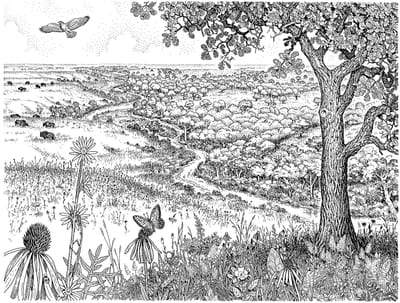Speculative Fiction & Herbalism

By Jana Greenslit
Speculative fiction invites the reader to imagine a different world, whether that be a revision of the past, a retelling of the present, or oftentimes, a vision for the future. While a world with spellcasting or dragons draws us in with its whimsy, the act of imagination is also fundamentally radical. This genre allows us to imagine a different way of structuring a society and connecting with other beings, including plants. The books on this list kept me company throughout my participation in the Greenspell Herbalism Intensive and helped me to dream of a more magical relationship with the plants in my own realm.
The Jasmine Throne by Tasha Suri
In this epic fantasy inspired by elements of South Asian history, Suri pits a forbidden magic connected to the roots and waters of the earth against a despotic monarch ruling through violence and religious fanaticism. When a princess is made a political prisoner in an abandoned temple, her potential salvation lies with a maidservant who has been hiding her identity as a powerful priestess. The magical connection to plants is complex - it brings about death, disease, and destruction, but also hope. The gift can feel like a curse, and while I don’t yet know what that means for my own herbalism practice, perhaps the takeaway is that of the relationship between power and responsibility.
The Lost Dreamer by Lizz Huerta
This lush and immersive story draws inspiration from ancient Mesoamerica and explores the ability to commune with plants through the spirit realm. It follows the intertwined paths of two women, Indir and Saya, both seers sought out for their ability to perceive realms outside of the mundane. The hazy, glittering depiction of connecting with plants in the spirit realm to seek their knowledge is a model for how to structurerelationships with plants in our own lives. As a bonus, when a temple of seers is threatened by a patriarchal faction who would like to end their lineage, the reader gets to root for the plants and spirits while booing the patriarchy all at the same time.
A Magic Steeped in Poison by Judy I. Lin
Lin crafts a tale imbued with the stories and myths from her childhood in Taiwan and features Chinese medicinal ingredients. The reader follows Ning’s journey as she steps into her mother’s legacy as a shénnóng-shi, a master of the ancient and magical art form of tea-making, to protect the lives of her kin and friends against criminal sabotage and imperial forces. If you can forgive the teenage angst, it’s worth sticking around for the delicate descriptions of the tea-making process, highlighting the importance of intention in every step, from harvesting ingredients to selecting a cup and pouring the water. Ning finds that tea has not only the power to heal, but to connect individuals on a deeper level, a sentiment that I am hoping to curate in stocking my own home apothecary.
This Poison Heart by Kalynn Bayron
Briseis can grow plants from seeds with a single touch, which alone isn’t cause for concern, but as her mysterious powers grow, her very presence causes the plants in her neighborhood to crack through the concrete to reach her. When a distant relative passes away and she inherits their sprawling gothic manor upstate, she has the opportunity to dig into her family tree for the source of her gifts. Weaving together Greek mythology and herbalist traditions, Briseis discovers her role in serving her community and protecting it from dark forces. This book had me dreaming of inheriting a mansion with a built-in apothecary, but more importantly, thinking about the ways in which my newfound knowledge of herbalism can serve not just myself but those around me.
The Queens of Innis Lear by Tessa Gratton
Gratton’s epic fantasy is a sprawling story of the struggle amongst three sisters to claim their father’s crown over their island nation. While the plot focuses on political intrigue, the magic system is a cautionary tale of lost knowledge.The island appears to be sickening year over year, a trend attributed to the neglect of wormwork in which practitioners commune with the roots and waters of the earth. There is a language of the tree specific to the island - bioregional, even - that has been banned by imperial rule and is now long forgotten by most. As various factions seek to revive the connection between the island and its inhabitants, it is a reminder to honor one’s environment and its ancient stewards.



Member discussion